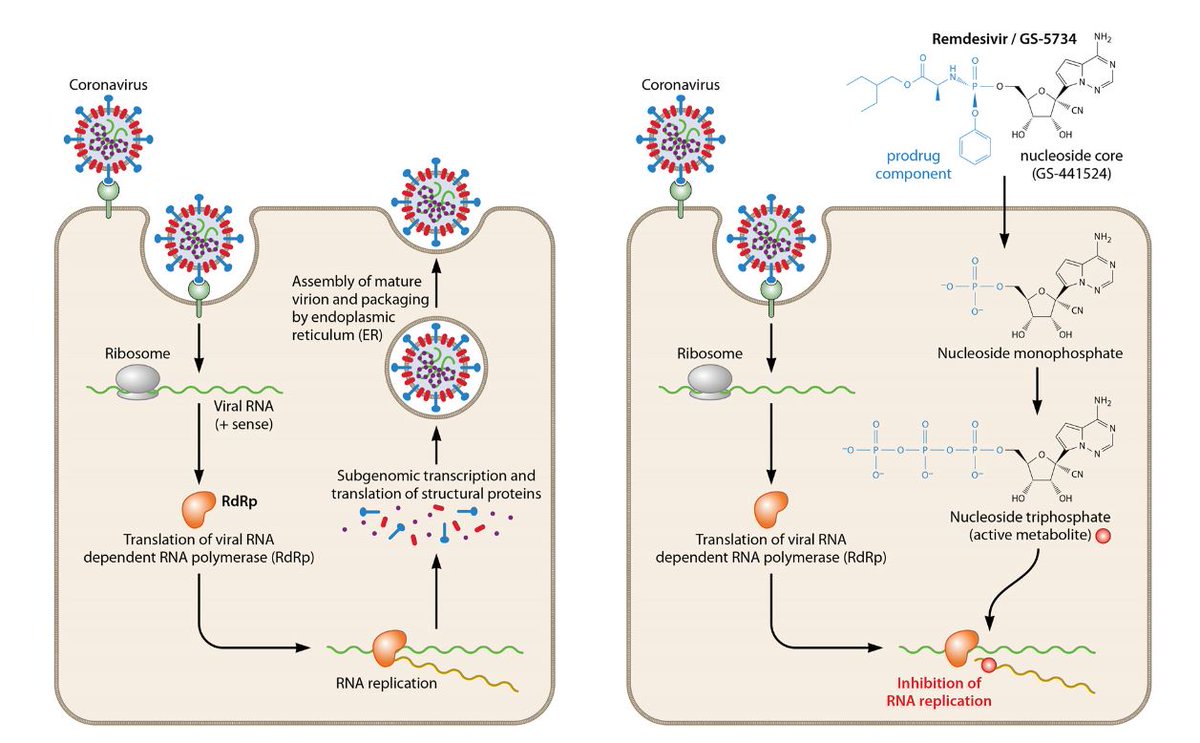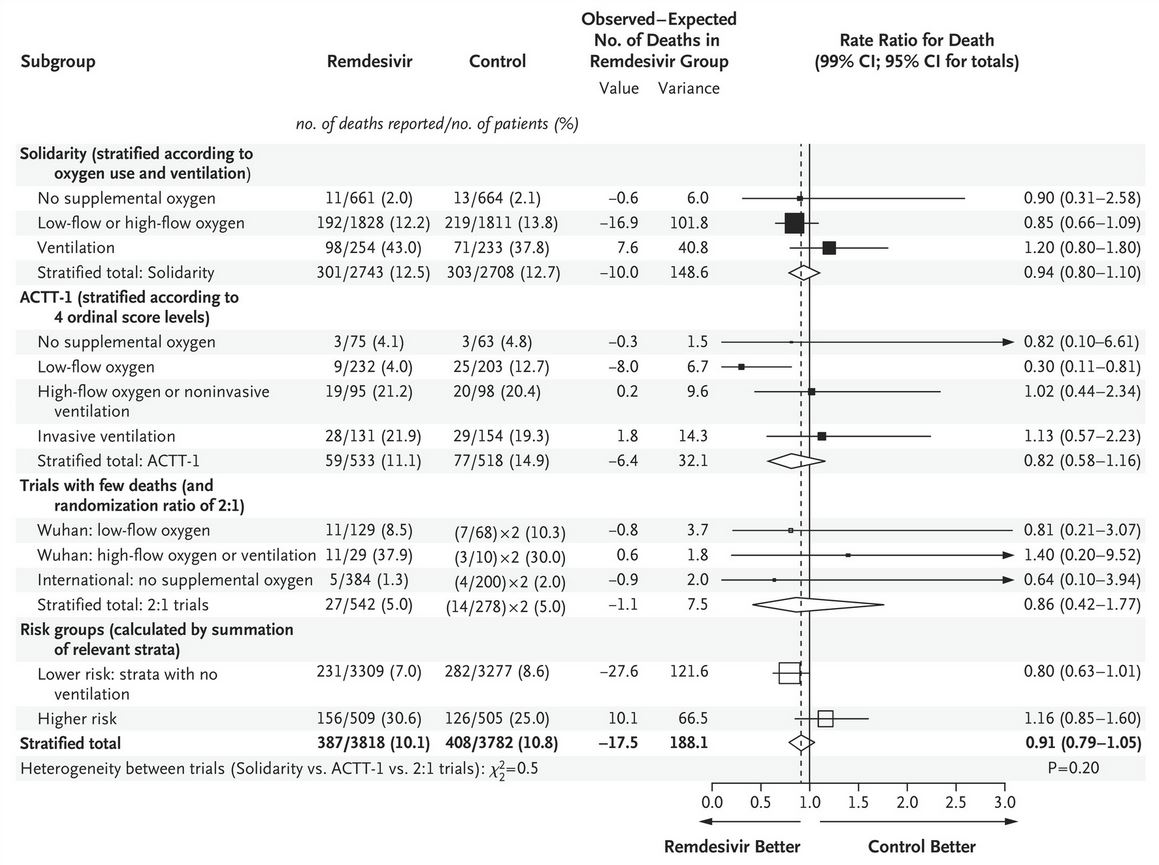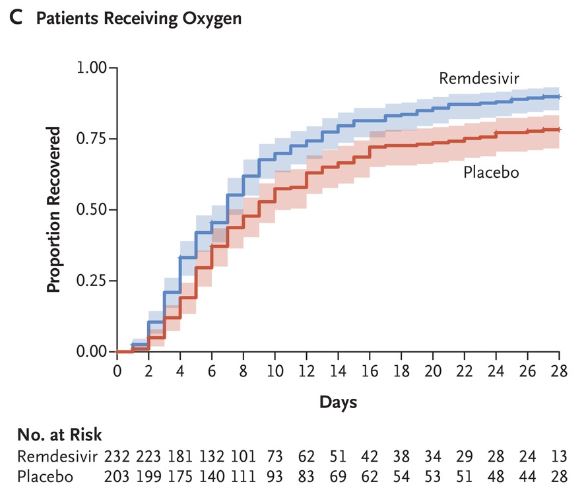1/ A 56M with DM & CKD presents with severe dyspnea, cough & fever. His symptoms began 4 days ago and have progressively gotten worse. He requires 4L of O2. Labs demonstrate COVID+ PCR and AKI on CKD – CrCl 22. You consider remdesivir and dex – would you give remdesivir?
2/ Let’s talk about everyone’s least and most favorite drug to debate – remdesivir! There are currently two issues in this case to discuss – the benefit of remdesivir and safety in patients with impaired renal function.
3/ Remdesivir is a nucleoside analog that inhibits RNA-dependent RNA polymerase. Following phosphorylation, remdesivir-triphosphate competes with natural occurring nucleoside triphosphates for incorporation into viral RNA, terminating RNA synthesis.
DOI: 10.1128/CMR.00162-20
DOI: 10.1128/CMR.00162-20
4/ Remdesivir has demonstrated potent antiviral effects in vitro, but does it work in real people? There are a few main trials that attempted to assess this. The two most cited studies are SOLIDARITY (DOI: 10.1056/NEJMoa2023184) and ACTT-1 (DOI: 10.1056/NEJMoa2007764).
5/ In SOLIDARITY, the main outcome was mortality. There was no difference in mortality in this study or in their included meta-analysis (including their data and prior published studies). In pts on O2 but not ventilated, there was non-significant trend toward mortality benefit.
6/ ACTT-1 had primary outcome of time to recovery. In this study there was improved time to recovery that was most pronounced in those on oxygen but not requiring intubation or ECMO. There was also signal for mortality benefit in those on low flow oxygen – 4% vs 12.7%.
7/ Thus the data is mixed. ACTT-1 was designed with time to improvement as the endpoint and primarily enrolled patients in North America. SOLIDARITY had a more heterogeneous population with mortality as the end-point, stratified by ventilated or non-ventilated.
8/ Many questions remain. As we understand more about COVID it makes sense that remdesivir might work best in certain populations early in their illness, when active viral replication is occurring. Stages for COVID have been suggested. doi:10.1001/jama.2020.22717
9/ At this point in time the NIH and IDSA still recommend use of remdesivir in hospitalized patients requiring oxygen. The WHO does not. But could this patient even get remdesivir with a CrCl < 30? Isn’t it contraindicated in those with impaired renal function?
10/ Theoretical risk of renal toxicity with remdesivir is related to both the drug and its carrier. Nucleotide/nucleoside drugs have been associated with mitochondrial injury in renal tubules and animal models have suggested risk with doses much higher than currently prescribed.
11/ A bigger concern was the carrier molecule (sulfobutylether-β-cyclodextrin) which is primarily secreted via the kidneys; excessive accumulation has been associated with liver necrosis and renal tubule damage in animal models. DOI: https://doi.org/10.1681/ASN.2020050589
12/ Observational studies have suggested the risk of using remdesivir in patients with renal dz is low. In one, 46 pts with AKI or CKD were treated with remdesivir with no significant liver injury or worsening renal impairment attributed to treatment. https://doi.org/10.1016/j.ekir.2020.10.005
13/ Another analysis compared pts with CrCl < 30 (n=40) to those with CrCl > 30 (n=307). This found that there was no difference in end of treatment AKI or LFT elevation necessitating drug discontinuation. https://aac.asm.org/content/early/2020/11/18/AAC.02290-20
14/ This is consistent with evidence from other drugs that include the same carrier, namely voriconazole.
15/ Summary:
 Remdesivir is a nucleoside analogue with antiviral activity
Remdesivir is a nucleoside analogue with antiviral activity
 It is likely beneficial in pts req O2 but not requiring mech ventilation or ECMO; mortality benefit unclear
It is likely beneficial in pts req O2 but not requiring mech ventilation or ECMO; mortality benefit unclear
 Emerging data suggests it may be safe in renal impairment; caution still warranted
Emerging data suggests it may be safe in renal impairment; caution still warranted
 Remdesivir is a nucleoside analogue with antiviral activity
Remdesivir is a nucleoside analogue with antiviral activity It is likely beneficial in pts req O2 but not requiring mech ventilation or ECMO; mortality benefit unclear
It is likely beneficial in pts req O2 but not requiring mech ventilation or ECMO; mortality benefit unclear  Emerging data suggests it may be safe in renal impairment; caution still warranted
Emerging data suggests it may be safe in renal impairment; caution still warranted
Thanks for tuning in! Look for more tweetorials and clinical pearls on the horizon and new excitement for the #IDFellows network in the new year. Thanks to @MDdreamchaser and @IgeGeorgeMD for their review. #IDTwitter #MedTwitter

 Read on Twitter
Read on Twitter





